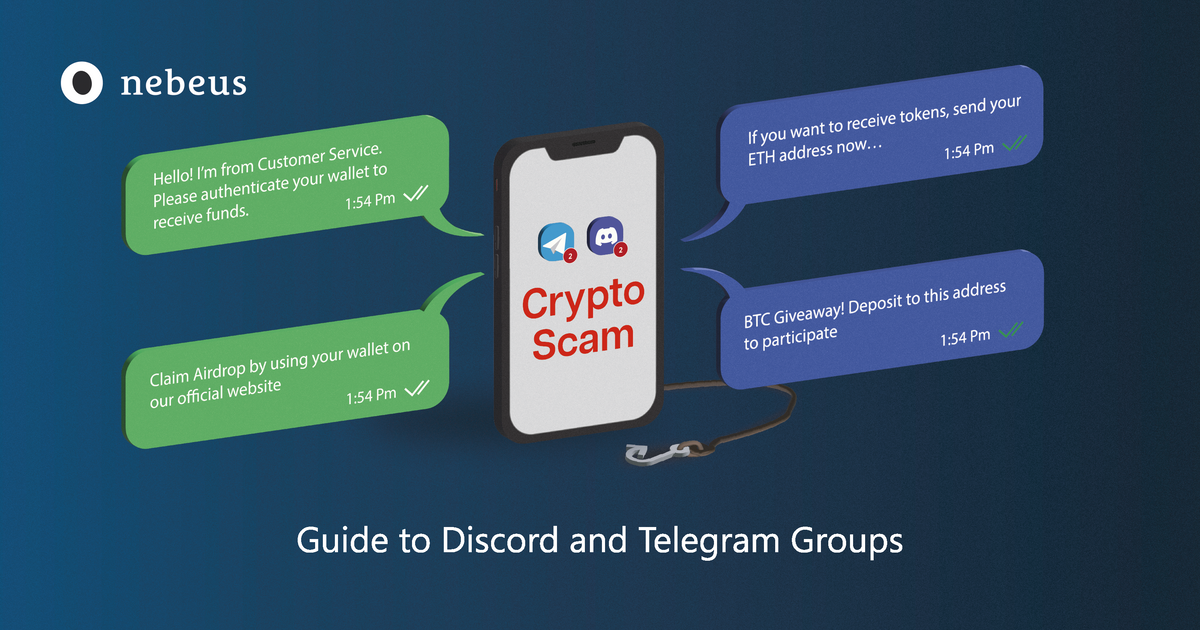There are a huge number of different ways that scammers try to trick users into handing over your crypto assets. Find out how to identify them and protect yourself from the attacks.
Social media is being used increasingly to spread cryptocurrency and NFT scams. Thefts occur on Instagram, Twitter, Facebook, Discord, and Telegram, and even include people who commit identity theft.
As these companies work to tighten their security measures, you must also stay vigilant about Discord scams and ones on other platforms you may encounter. When it comes to cryptocurrency, the social platforms on which users typically find crypto-related scams are Discord and Telegram.
Can you get scammed through crypto?
Unfortunately, yes, as cryptocurrency scams are incredibly common, as the following statistics show:
- Crypto-based crime hit a new high recently, according to the 2022 Crypto Crime Report. Illegal crypto wallets stole $14 billion – an increase of 80% from 2020. Such a cost can’t be ignored by crypto and social media companies.
- Forbes reports that since 2021, crypto scammers have stolen $1 billion from 46,000 people.
- The FTC said crypto-related crimes account for one in four dollars lost to fraud, more than any other payment method, with individual losses averaging over $2,500.
But how do crypto scams work?
How do cryptocurrency scams work?
There are a huge number of different ways that scammers try to trick users into handing over your crypto assets. For example:
- Fake Trading Platforms: Some scammers construct sophisticated, counterfeit cryptocurrency trading platforms. They lure users with the promise of low fees or high returns, only to disappear once they've collected enough funds.
- Ponzi Schemes: These scams offer high return investments but rely on inflow from new participants to pay returns to earlier investors. Eventually, these schemes collapse when the inflow of new participants slows.
- Fake Wallets: Scammers create fraudulent digital wallets for victims to store their cryptocurrencies. Once a victim deposits their cryptocurrency, the scammer can take control of the assets.
- Impersonation Scams: Scammers impersonate legitimate cryptocurrency businesses, or even well-known individuals, promising big returns for small investments. Victims are often tricked into transferring their cryptocurrencies to the scammer's account.
- Phishing Attacks: In these attacks, scammers trick victims into revealing their login credentials or private keys by sending them fake emails or messages that look like they're from a trustworthy source.
- Initial Coin Offering (ICO) Scams: Here, scammers create a hype around a fake new cryptocurrency, often accompanied by promising whitepapers and professional websites. They encourage people to buy into the coin early, before disappearing with the collected funds once the ICO ends.
- Pump and Dump Schemes: Scammers inflate the price of a cryptocurrency, usually a low-market-cap altcoin, by spreading false news or hype (the 'pump'). Once the price has significantly risen, they sell their holdings (the 'dump'), causing the price to plummet and leaving the rest of the holders at a loss.
- Malware: Some scams involve malware that, once downloaded on a user's device, can track keystrokes or even directly steal cryptocurrency from a user's wallet.
- Ransomware Attacks: In this type of scam, malware is used to encrypt a user's computer files, which the scammer then promises to decrypt in return for a cryptocurrency payment.
- Social Media Scams: Scammers can create fake social media accounts impersonating notable personalities or brands, promising to 'giveaway' cryptocurrency in return for a smaller initial deposit.
It's crucial for anyone involved in the cryptocurrency space to remain vigilant and double-check all transactions, platforms, and offers to avoid falling victim to these types of scams.
How to Spot a Cryptocurrency Scam on Discord Servers?
Discord was created for gamers, but its platform has attracted everyone from university study groups to cryptocurrency enthusiasts. On these crypto Discord servers, experienced and novice traders discuss altcoins and share predictions. Scammers, on the other hand, work to profit from these open conversations.
Discord's popularity doesn't mean it's immune to scams and compromises.
Scammers have designed many creative ways targeting Discord users to get them to click on malicious links via direct messages to steal their personal information and assets.
Here's some ways how you can spot and avoid falling victim to a cryptocurrency scam on Discord:
- Beware of Direct Messages: Be cautious if you receive a direct message from someone you don't know, particularly if they are offering investment advice, promising guaranteed returns, or asking for personal information. A common scam on Discord involves users receiving direct messages from 'bot' accounts, offering unsolicited cryptocurrency advice or investment opportunities.
- Verify User Identity: Scammers often impersonate server moderators or famous individuals within the crypto community. Always verify the identity of the person you're speaking with by checking their role within the server and their account creation date.
- Secure Personal Information: Never share personal information such as your private keys, wallet details, or other sensitive data on Discord. A legitimate cryptocurrency company will never ask for these details via Discord.
- Double-Check Links: Scammers often use phishing links to steal personal information. Always double-check the URL of any link you click. If you're unsure, use a URL scanner tool to confirm if the link is safe.
- Examine Server Security: Higher server security levels often indicate a safer environment. Servers with little to no verification levels may be more likely to harbor scammers.
- Beware of Urgency: If a message puts pressure on you to act immediately or miss out on an opportunity, it's a red flag. Scammers use this tactic to push individuals into making hasty decisions.
- Unrealistic Promises: Be wary of anyone making guarantees about investment returns. In the world of cryptocurrency, there are no sure bets.
- Giveaway Scams: Be skeptical of 'free' giveaways, which are often scams. While legitimate contests do happen, they're usually conducted in a more formal and transparent manner.
These Discord scams don’t just emerge from small, unverified Discord channels. Scammers have found ways to infiltrate large companies to make their scams more likely to succeed. There are two prominent examples of compromised Discord safety:
OpenSea’s Carl-Bot
OpenSea, the primary marketplace for non-fungible tokens (NFTs), reported major Discord problems very recently in May 2022, involving spambots posting phishing scams and links to countless users.
The spam allegedly originates from an automated Carl-Bot that OpenSea was using, a Discord bot used for miscellaneous admin tasks and user support. Typically, such vulnerabilities can emerge when a Discord channel's administrator is phished or a cyber security Discord bot is compromised.
Axie Infinity’s Discord Bot
MEE6, the game's Discord bot, similar to OpenSea’s Carl-Bot, was infiltrated by hackers, who used it to issue fake mint notifications from executives’ accounts.

Protecting Yourself from Discord Scams
On cryptocurrency-focused Discord community servers, scammers are often targeting Discord users with private messages claiming to be from an exchange that is giving away cryptocurrency. To avoid this, there are several precautions and steps you can take:
- Stick to investing your time and money in the most popular exchanges as they are least likely to be compromised.
- Make sure you do your homework before opening an account on any exchange or wallet. For example, find out who the people behind the exchange or wallet are and what country the company is registered in.
- If you are directly contacted, don't give in to the pressure of making a deposit or disclosing personal data.
- Avoid using any random wallet you find in the app store at random, and stick to wallets from reputable providers and exchanges.
- Use two-factor authentication (2FA) and a password manager to protect sensitive data.
- To maintain Discord safety, ignore any Discord messages promising freebies in exchange for clicking on links you don't recognise.
Remember, even if you cannot recover your assets after being scammed, it’s important to help other Discord community users by informing the company about any scam-related messages you receive.
How to Spot a Cryptocurrency Scam on Telegram Groups?
People interested in cryptocurrency often gather in groups on Telegram to talk about the latest developments and price movements. A large part of the reason scammers and thieves use Telegram is the ease with which they can pose as someone else or an organisation on the platform.
When it comes to crypto scams on the platform, nearly every regular Telegram user has been the victim of at least one scam at some point. Almost all of these crypto scams have one thing in common: they primarily target newcomers to the crypto space.
Everyone who uses Telegram should be aware of the most common scams, including:
Tech Support Scams are Common on Telegram
Scams pretending to be customer service can come in many forms. It's not uncommon for members of the group to be directly messaged by administrators and other members of the group claiming to work for large exchanges and try to charge users thousands of dollars for sorting account security issues.
For the most part, these phishing scams and other attempts demand remote control of your computer, something no one from a legitimate support team will ever ask for. Scammers often try to get you to send digital currency to an external address to ensure greater protection of your Coinbase account. Scammers are also known to ask for your login credentials in order to gain complete control of your account.
Sadly, copycat administrators tend to target newbies, who are more susceptible to being duped than regular crypto enthusiasts. The best way to tell if someone is posing as an admin is to copy their username and search the group for posts by that user. If you see nothing, it's more than likely a fake administrator.
Remember: never share your seed phrase or any other personal information in a direct message or any other form of electronic communication.
Fake Telegram Groups
The fake group scam on Telegram is one of the platform's most popular and dangerous scams. Copycat groups closely mimic the originals, but with one important difference: their sole purpose is to defraud you. Members of the original group are often manually added to the scam groups by the scammers, making it difficult to distinguish between the two.
The actual scam can come in many forms. For instance, scammers could offer pre-launch tokens at a reduced price for those who purchase them first.
Luckily, this scam is quite simple to avoid, making it a win-win situation. Changing your group invitation settings to receive invites from only your contacts will eliminate this issue. Always check the group members and verify the authenticity of the group through external sources like the official website of the crypto project.
Here's some ways how you can spot and avoid falling victim to a cryptocurrency scam on Telegram:
- Unexpected Direct Messages: Be wary if you receive a direct message from someone claiming to be an admin of a group, or a user offering investment tips or opportunities. Scammers often use these tactics to trick users into revealing sensitive information or sending cryptocurrency.
- Verify User Identity: Scammers on Telegram frequently impersonate famous personalities or group admins. Double-check the person's identity before proceeding with any interaction. An admin or a prominent person in the crypto space won't typically send you a direct message without prior contact.
- Don't Share Personal Information: Just like on Discord, never share your personal data such as private keys or wallet details on Telegram. Legitimate crypto organizations won't ask for these details.
- Be Cautious With Links: Look out for phishing links sent through direct messages or posted in groups. Always verify the URL before clicking, and when in doubt, use a URL scanner.
- Pressure to Act: If someone is pressuring you to invest immediately or face a missed opportunity, take it as a red flag. Scammers often use urgency to trick users into falling for their schemes.
- Promises of High Returns: Be skeptical of anyone promising high or guaranteed returns in a short span of time. The crypto market is highly volatile and no returns can be assured.
- Suspicious Airdrops and Giveaways: While some airdrops and giveaways are legitimate, be careful if the giveaway requires you to provide personal information or send a small amount of crypto to 'verify' your wallet.
What to do if you’ve spotted a scam or become a victim on Telegram
Scam victims who have sent crypto should be aware that their chances of recouping their losses are extremely slim. Such scams are generally difficult to recover, even when standard fiat money is involved.
However, you can still report crypto scams to help prevent this from happening to anyone else. Scams, including when users commit identity theft, on Telegram can be reported by contacting [email protected].
People also ask | FAQ
How can you tell if someone is a crypto scammer?
Spotting a crypto scammer can be a challenge, particularly due to their evolving tactics and persuasive disguises. However, certain red flags should instantly trigger your scam radar. Scammers often create fake platforms, impersonate reputable businesses, or send unsolicited messages promising too-good-to-be-true returns. Watch out for pressure tactics to make quick decisions or requests for confidential data, such as your wallet's private key or seed phrase. Always remember that legitimate organizations will never ask you for these details.
Can a crypto scammer be traced?
The underlying technology of cryptocurrencies, blockchain, is fundamentally a public ledger, which implies that transactions are visible. However, tracing a scammer can still be a daunting task. While transactions are transparent, they are pseudo-anonymous - tied to a digital address rather than personal information. Tracking down the individual behind the address requires substantial technical expertise and often legal authority. This inherent anonymity of cryptocurrencies is, unfortunately, a lucrative feature for potential scammers.
Why are crypto scams so common?
The prevalence of crypto scams can be attributed to several factors. The novelty of the crypto space, coupled with a general lack of understanding, provides fertile ground for scammers. Also, the pseudo-anonymous nature of cryptocurrencies allows scammers to operate with a degree of impunity. Additionally, the unregulated nature of much of the crypto world and the lack of uniform legal frameworks to deal with crypto scams provides opportunities for malicious actors to exploit.
How to report crypto scams?
If you've fallen victim to a crypto scam or spotted one, it's crucial to report it to protect both yourself and others. Begin by collecting all related information, such as usernames, messages, transaction IDs, and any other relevant data. If the scam took place on a social platform like Discord or Telegram, report it to their respective support services. If it involved a specific crypto service, alert the service provider. Moreover, depending on your location, you can also report the incident to local law enforcement and online fraud agencies. Remember, while recovery of lost funds may be challenging, reporting the scam contributes to better overall security in the crypto space.
La inversión en criptoactivos no está regulada, puede no ser adecuada para inversores minoristas y se puede perder la totalidad del monto invertido.










